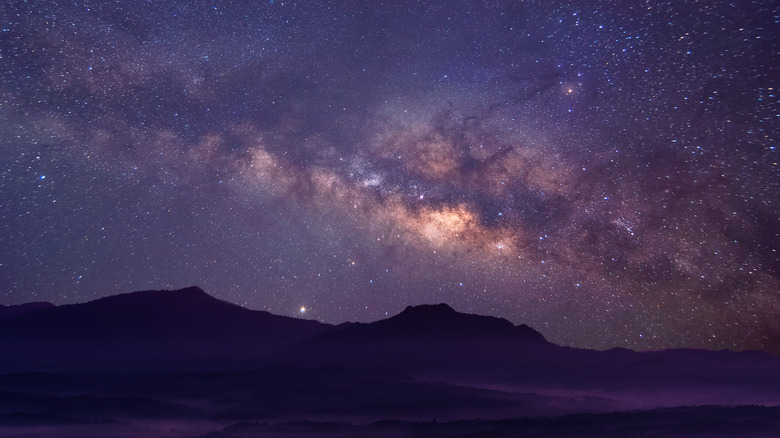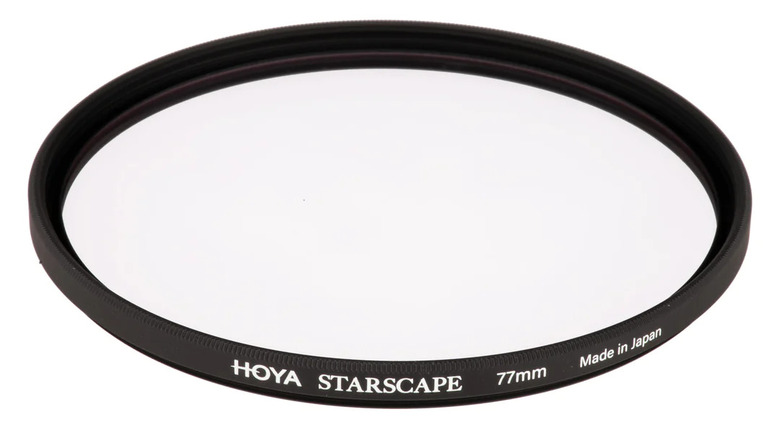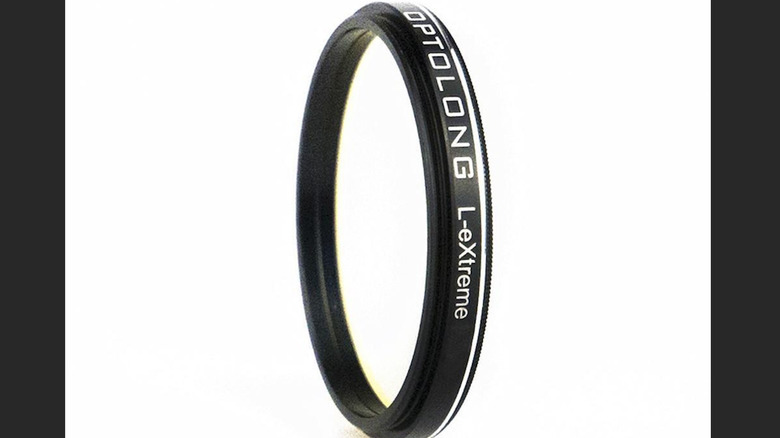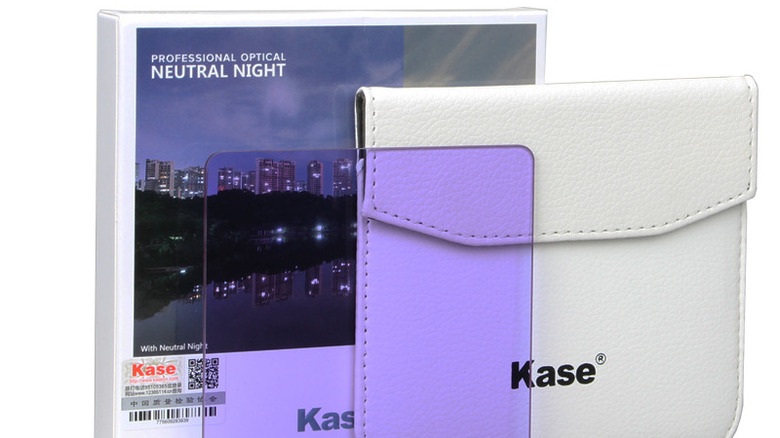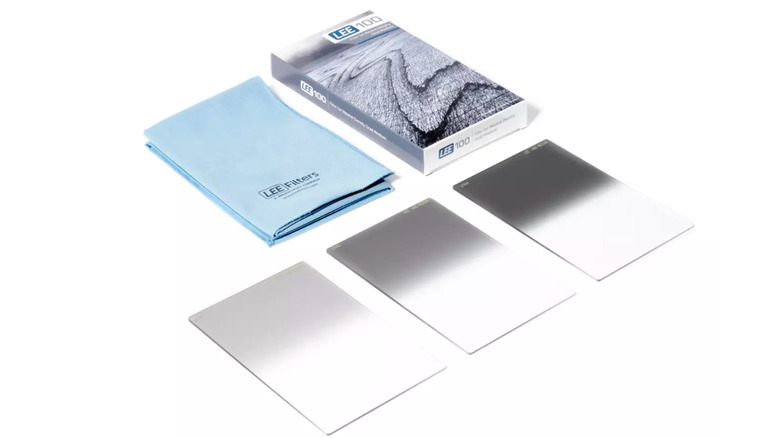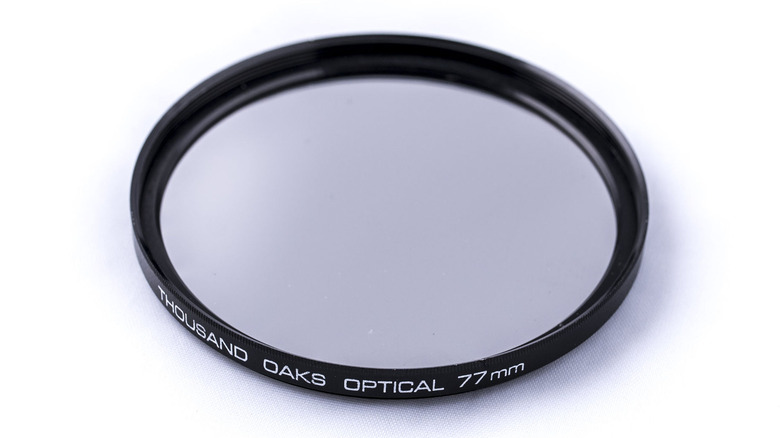5 Of The Best DSLR Filters For Astrophotography
We may receive a commission on purchases made from links.
If you're a photographer, you know that the subjects you capture can determine how you shoot and what you shoot with. The gear a nature photographer will utilize will undoubtedly differ from that of someone covering a warzone, or a football game. Astrophotography in particular can require specific gear, which isn't surprising when you consider the subjects you're photographing might be trillions of miles away (and that's just in our solar neighborhood.)
Even the most powerful DSLR cameras will struggle to accurately capture the night sky. The light coming from stars and galaxies is traveling very far, passing through lightyears of dust and other debris, and is faint even to the natural eye. That's not even taking light pollution into account, which any astrophotographer shooting close to a populated area must contend with.
Fortunately, there are filters available that can help bring out the light you need and discard the light you don't when photographing the night sky. Different filters serve different purposes, like specifically filtering out light pollution or narrowband filters that specifically pick up the wavelengths of light emitted from certain nebulas. To help you capture the intergalactic images you want, here are the best DSLR filters for astrophotography.
Hoya Starscape
A major issue astrophotographers must deal with is the skewed coloring of nighttime images, often due to light pollution. Sodium and mercury-vapor streetlights and other powerful lights from urban areas will cast your photos of the night sky with unwanted shades of green, brown, and yellow. The Hoya Starscape will help reduce the skyglow in those yellower shades and give your images a cooler, more pleasing, and natural look. Additionally, it will increase the contrast between the sky and the stars you're capturing, for a cleaner, more detailed image. Even better, you have a range of options for your lenses, with the Starscape's circular lens filters coming in 9mm, 52mm, 55mm, 58mm, 62mm, 67mm, 72mm, 77mm, 82mm, and 100mm.
However, it's a shame there's no 150mm option, and the only filter insert size is limited to 100mm. Another downside to the filter is that it darkens the image by a half-stop, which is not ideal considering you want all the light you can get in astrophotography. Hoya, a Japan-based brand of optical equipment, has been trusted for decades, and its Starscape is one of the best light pollution filters on the market. It's also reasonably priced, with the 55mm lens normally priced at Amazon for $44, and currently available for $33.
Optolong L-eXtreme
If you're looking to photograph nebulas that are far out in space, the Optolong L-eXtreme is a great dual-narrowband filter that will isolate the H-alpha (Ha) and Oxygen III (OIII) wavelengths of light those nebulas are emitting. The light from such a distance is so faint to begin with, and by highlighting these frequencies and blocking those from nearby light pollution, you can contrast these galactic dust clouds from the night sky and produce some really stunning images. Its high-quality filtering is due in part to a superior multi-layer coating process that makes sure the filter is letting light through consistently across its surface.
The Optolong L-eXtreme doesn't come cheap; the 2" is priced at $308 on Amazon. Before you commit to buying this useful ultra-narrowband filter, keep in mind that its clip-in sizes are currently only available for Canon cameras. The filter will also produce a darker image, which can limit how you frame the photograph you want to achieve.
Kase Wolverine Neutral Night
If you're using a DSLR camera and associated accessories, you should be taking extra care to protect your gear, considering how expensive it can be. But sometimes astrophotography requires you to go out to a barren desert, or climb a rocky hill, and you'll want to make sure your equipment can survive the trip. Because of its high-quality glass and construction, the Kase Wolverine Neutral Night filter is a solid option for astrophotographers. Its Pro HD optical glass and metallic nano coatings are scratch-resistant and tough, providing much-needed durability. Additionally, the filter comes with a storage pouch to keep it protected during transportation.
Durability is a great asset, but not worth much if it's a poor filter. The Kase Wolverine Neutral Night is thankfully a really good light pollution filter that can reduce the yellow-orange glow from city lights, and it has a variety of square plate and clip-in sizes to suit your needs. Unfortunately, the Neutral Night inadequately filters out LED light, which is becoming more prominent within urban skylines. It's also a pricey option, with the 100mm filter listed at $175 on Amazon. But if you're looking for a solidly-built filter, the cost is worth it.
LEE100 ND
Graduated neutral-density filters are more associated with daytime landscape photography, but if you're looking to photograph the night sky and the landscape under it within the same shot, they can be invaluable. Graduated ND filters will block out light on only part of its surface, and allow it to pass through the rest. Landscape photographers use these to lower the exposure of the bright daytime sky while still accurately capturing the ground. Astrophotographers can use ND filters in the opposite fashion, reducing the light coming from a city skyline while getting all the light possible from the night sky. That way you can capture constellations and stars in the same shot as a city skyline (or a natural landscape like mountains and trees).
The Lee100 ND is a great graduated filter that will block out light for part of your frame, without distorting colors. The filter is high-quality and easy to travel with because it's lightweight and durable. Notably, it's built of resin rather than glass, which reduces reflectivity but makes it susceptible to water and oil damage. A set of three can get pricey but will give you the option to reduce light by one, two, or three stops. You can find them on Amazon for $257, but unfortunately, their range of sizes is limited.
Thousand Oaks Optical BP82-T Solar Filter
The sky is literally the limit for astrophotographers looking for a subject, but there's one object that can be imaged up close and personal — the sun. Many astrophotographers look to capture the night sky and don't consider shooting the Sun because its light is too overwhelming for any DSLR. However, with a solar filter, you can block out so much of that light that you can capture a detailed photograph of the sun's surface, including its sunspots and granular texture.
The Thousand Oaks Optical BP82-T uses a black polymer filter to reduce incoming light by several stops and enables you to photograph the sun in the yellow-orange spectrum. The Thousands Oaks Optical filters are reasonably priced, with the 82mm size listed at $63 on Amazon. However, there aren't a lot of size options, and you want to make sure the filter you select perfectly attaches to your DSLR lens. If it doesn't, you'll risk vignetting from the powerful light coming from the sun. Even worse, you could damage your lens or camera. Speaking of damage, keep in mind that the BP82-T's polymer construction means it's not water resistant, so make sure to keep it dry.
